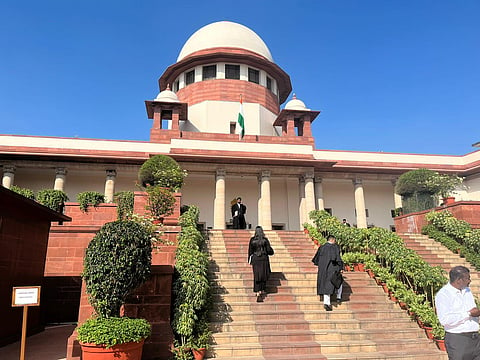

NEW DELHI: The Supreme Court on Monday directed the Centre to prepare standard operating procedures (SOPs) and formulate a national model to be adopted by all the states and Union territories for managing menstrual hygiene for school-going girls.
Terming the issue as of ‘immense important’, a bench of CJI DY Chandrachud, Justices PS Narasimha and JB Pardiwala also directed the states & UTs to submit to the secretary, Union Ministry of Health and Family Welfare (MHFW) their menstrual hygiene management strategies and plans being executed, either with the funds provided by the central government or through their own, to the Mission Steering Group (MSG) of the National Health Mission (NHM) within four weeks.
To re-evaluate the guidelines, the bench nominated the Secretary, MHFW to facilitate coordination with the state governments and UTs. Additionally, it directed all the states and UTs to notify the appropriate ratio of girls’ toilets for residential and non-residential schools in their respective territories and steps to take to ensure low-cost sanitary napkins and vending machines in schools.
“Besides making the provision of this machine, they shall also ensure that disposal mechanisms are available for safe disposal of sanitary pads,” the bench also directed. The bench directed the Centre to file an updated status report by the end of July 2023.
The court’s order came in a plea which was filed by Congress MP Jaya Thakur seeking free sanitary napkins and for provision of separate toilets in all government and residential schools. It argued that inadequate menstrual hygiene management options were a major barrier to education since many girls dropped out of school due to a lack of access to sanitation facilities.
The plea highlighted the lack of access to hygienic methods for females aged 11 to 16 years. The ministry stated that menstruation and menstrual practices are clouded by taboos and socio-cultural restrictions for women as well as adolescent girls in India which is combined with limited access to products of sanitary hygiene and a lack of safe sanitary facilities.
“Moreover, traditionally, there have been practices of using old clothes as pads by recycling them, and use of ash or straw, which not affect menstrual hygiene but also have long-term implications for reproductive health. The government is dedicated to increasing awareness among adolescent girls on menstrual hygiene, building self-esteem and empowering girls for better socialisation. The government is also working towards increasing access to and use of high-quality sanitary napkins for girls in rural areas,” the ministry has said.
Also in top court
SC to hear plea by Gyanvapi mosque panel
The Supreme Court on Monday agreed to hear on April 14 a plea by the Gyanvapi mosque management committee seeking arrangements for ablution (wazu) where the Shivling was reportedly found in view of more rush during Ramzan. For the mosque committee, Senior Advocate Huzefa Ahmadi submitted before the CJI-led bench that since the arrangements had not been made, the worshippers performing Wazu had to use water from a drum.
Enrolment fees: SC seeks BCI response
The Supreme Court on Monday considered a plea challenging different enrolment fees being charged from advocates and sought a response from BCI and all state bar councils. A CJI-led bench called the issue significant and termed it an exorbitant fee to the petitioner’s submission that it affected young aspiring advocates.
SC upholds Delhi HC verdict on Agnipath
The Supreme Court on Monday dismissed the petitions seeking directions to complete the recruitment processes initiated for the Indian Army and the Air Force, which were discontinued after the Agnipath scheme was announced in June 2022. The pleas challenged the Delhi HC verdict, which upheld the Agnipath scheme.